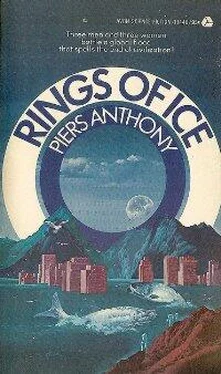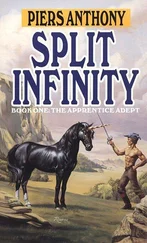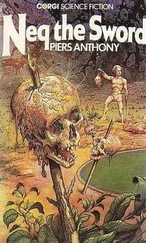“This makes no sense at all!” she expostulated to Gus. “This Annular Theory takes no note of, and makes no allowance for, the theory of drifting continents. Most of the things Isaac Vail seeks to account for can also be explained by continental drift. The pattern of ice ages—”
“You’re forgetting two things,” Gus said.
“What two things?”
“First, Mr. Vail died in 1912—long before the continents started drifting. So you can’t hold that against—”
“The continents have been drifting for billions of years!”
“You know what I mean. Second, look at that.” He gestured at the rain outside. “The canopy is here again. Does your continental drift explain that?”
“No, it doesn’t have to. The rain is here for another reason.”
“Uh-huh,” he said smugly.
“Oh, go listen to your radio!” she said.
He did. Or tried to. The rain continued—but not the shortwave broadcasts. Zena estimated that between eighty and ninety feet of rain had fallen—and the British news was off the air.
Zena fell out of bed. “What happened?” she cried. Thatch sat up on his floor mattress, rubbing his eyes. Floy stuck her head in the door and yelled: “It stopped!”
Zena stared at the window. A few drops of water dribbled down it—but the steady beat of rain was gone. No wonder her sleep had been disturbed!
Gloria rolled out of the upper bunk. “It’s the fortieth night after the fortieth day,” she said. “The flood is over!”
Zena checked the calendar. “Ridiculous!” she said. But forty days had been marked off.
They dressed and went outside, even Gus. The surface of the road was still slick, where it wasn’t pitted or washed out, but no water was being added from the sky. The effect was eerie.
They returned to the bus and had a sober breakfast. “Is it really over?” Floy asked. “Are you all going home now?”
Home. Zena turned away.
“This is our home now,” Gus said. “And there may be more rain. We’ll have to be careful, very careful.”
Yes, there would be more rain. Zena knew that what had just passed was only a minor squall compared to what was to come. But how could she tell them that?
Now the dawn was coming. They stood in a row outside and watched the first sunrise in over a month. It was spectacular, for the massive moisture in the atmosphere made the rays of the sun splay grandiosely.
“Other survivors will be abroad soon,” Gus said. “And they’ll be hungry and not too civilized. We’ll have to survey the entire area and double our guard.”
Zena groaned inwardly, but knew he was right—again. This could be the most dangerous period for them, because they had good shelter and good food.
By full daylight, unconscionably bright, they saw that erosion was horrendous. Zena estimated that approximately a hundred feet of rain had fallen. It had scoured the landscape, ripping out trees and houses, undercutting the road itself. What remained was a steaming wasteland seemingly bare of life.
Thatch and Gordon cut walking staffs and set out on an area hike. Gus and Karen returned to the bus to sleep. That left Zena and Floy for the nearby explorations and guard duty.
“At least they let me out!” Zena said. “I haven’t been allowed to do anything useful for weeks!”
“You’re lucky,” Floy said, leaning heavily on her pole so as not to fall.
“What’s lucky about it? Everybody has to pull his weight, and I’m eager to pull mine.”
Floy shrugged awkwardly.
“Now don’t you do it too!” Zena cried. “I haven’t raised an issue about it because there’s been no privacy—but something’s going on. What’s the big secret?”
“You really don’t know?”
“Of course I don’t know.”
“Well, Gus says there’s going to be a lot more rain. Enough to drown the whole world, maybe.”
“Gus is right, for all the wrong reasons. But—”
“So we’ll have to make more people. Babies.”
Zena sighed. “Gus has had the making of babies on his mind from the outset. The mechanics of it, anyway. He and Karen—”
Floy shook her head. “Karen wouldn’t live through it. That’s why she uses an IUD. And I’m too young, Gordon says. But you—”
“That’s enough!”
“Sorry. You said you wanted to know.”
Zena paused beside a plain of bare bedrock, scoured clean by the water. “I’m not having any baby!”
“You’re the only one who can. So Gus said to take care of you, because if anything happened to make you sterile—”
“I said enough!”
Floy fell silent and stepped over some rubble, using her stick as judiciously as she could. Out in the open she handled herself better, because she had more room to correct for error. Dust Devil leaped atop a boulder and peered about, tail switching. He smelled something.
“This is ridiculous!” Zena said.
“You’re always saying that.”
“That’s no refutation.”
“I wish I could do it,” Floy said. “Maybe in another year—”
“Whatever for?”
“I’m not much for doing things, but I could take care of a baby,” Floy said. “I’d make a strap for it, or a basket or something, so I couldn’t drop it, and I’d nurse it—”
“Nurse it!”
“There isn’t any other way,” Floy said. “No store-bought formula—and what’s wrong with it, anyway?”
“Let’s talk about something else.”
“Sure,” Floy said. “But why does it make you sick?”
Zena moved ahead, not answering. There was, really, no answer: she had been raised conservatively, and somewhere along the way had developed a strong aversion to the sordid aspects of life. Her devotion to meteorology and science had kept such matters safely distant—until the rain came.
That reminded her, deviously, of the stupidity of men. What had happened to those aboard the space station? Would there ever be a rescue mission for them, or would they suffocate when they ran out of air? They were above the rain—but the rain meant their doom, too. Poetic justice, but it was a vicious poem.
“No forage anywhere near here,” Thatch announced. “This is all slope, washed out to bedrock. We have to move on.” And Gordon nodded soberly.
“Where are we?” Gus asked, bringing out the map.
“Somewhere in the approaches to the southern Appalachian range,” Gordon replied. “Northern Georgia, probably. Not that it makes much difference now.”
“Sure it makes a difference! We must be somewhere near Atlanta.”
“That’s right. We skirted a huge city a day or so before we parked. I figured that was Atlanta. That’s how I knew we were reaching safe high ground.”
“Atlanta’s big enough, all right. Should be a lot of supplies there.”
“We’ve been through that!” Zena objected. “Cities are dangerous!”
“So is starving,” Gus retorted.
“If we head on into the mountains,” Gordon said, “we should strike the major pine forests. Those are built to take rain; most of those trees probably survived. And where there are trees, there is soil—and life.”
“How about gasoline?” Gus asked.
Gordon spread his hands. “Do we want to travel much?”
“I don’t mind your forest notion,” Gus said. “In fact, I like it. But we’ll camp there in a lot more style if we load up first on gas, and canned goods, and batteries and books and seed grains—”
“Seed grains?” Karen asked.
“Sure. We’re going to be farmers. We have to start raising our own food, if we expect to live any length of time. There won’t be any corner grocery store.”
Gordon puffed out his cheeks in a soundless sigh. “You’ve thought it through!”
Читать дальше










